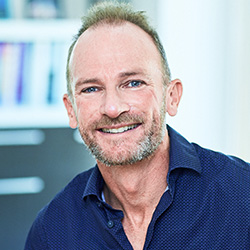
PhD (2011)
Graeme is an independent management consultant and an expert in providing services to improve strategy execution in large organisations. He specialises in defining, mobilising, leading and evaluating large transformation programs.
Graeme previously worked as a principal consultant in a large national consulting firm. He was also an officer in the Air Force and led a national team of 25 internal consultants, earning him a Chief of Air Force Commendation for outstanding leadership. In these roles Graeme led the development of other consultants with a strong focus on maintaining professional and ethical standards.
10 June 2022
What is your current position and affiliation?
I am currently Director at 3Pillars Asia Pacific and Managing Director at Intelligent Edge Pty Ltd. I personally established Intelligent Edge in 2007, then 3Pillars Asia Pacific with two business partners in 2008. Both companies consult to large organisations in Australia, including the defence, energy, government, financial services, healthcare, mining, utilities and technology sectors.
Which year did you obtain your PhD and from which Research School?
I was awarded my PhD in 2011 from the CBE School of Accounting and Business Information Systems.
What is the professional achievement that you are most proud of?
I have had the privilege of working on over 100 consulting engagements with a great number of different organisations for over 24 years. There are three engagements that stand out – leading a national team in the Air Force; ¬ leading a project management office in a large private sector company; and directing a transformation program in WA Health. Upon reflection, three things make these roles stand out:
- they were challenging roles where I could make a difference
- I had strong support from the Executive
- I was leading a professional team.
I am very proud of what I achieved in each of these roles, and was fortunate to work with great teams – it’s the people you work with that really make the difference.
How have you applied the knowledge and skills you obtained from ANU to your career?
The focus of my PhD research was to understand how organisations can improve the evaluation of Information and Communications Technology projects. From my research I developed a better understanding of evaluation practices in 36 Australian companies. Following my PhD, I have been engaged by a number of clients to implement end-to-end project lifecycles (concept to cash), conduct health checks, evaluate projects and provide independent assurance. I have used the knowledge gained from my PhD to help develop evaluation frameworks and to inform this work.
What skills or traits are most desirable for consulting companies hiring HDR graduates?
The field of consulting is many and varied. When people – including my own son – have asked what a management consultant is, I often say a ‘doctor for organisations.’ Consulting companies will hire multidiscipline graduates who can understand, diagnose and solve a broad range of problems for clients. Like a doctor, consultants require a level of knowledge and technical competence. In my view, however, the best consultants have three traits.
- They put their client’s needs first, without incentive of profit or provision of false promises.
- They show a high level of emotional intelligence by understanding their clients before providing any advice.
- They make change by being pragmatic and influencing their client – a solution is only helpful if it gets implemented.
What would be your top three advice tips for our current HDR students who wish to pursue a career in industry?
Working in industry is a great way to apply your learning and to develop in other ways. If you haven’t worked in a particular sector it’s often difficult to know if it’ll be a good fit. Within each sector the companies can be very different in size, types of work, work conditions, social impact and culture. My advice to current HDR students is to research the companies in the sector you are interested in and begin to network. This networking could be through research, offering to share on research findings and/or joining an industry body. Talk to as many people as possible. My experience from my own PhD research is that people in industry are very happy to help. Just ask!
